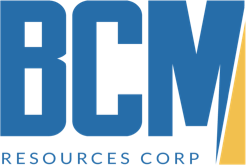Vancouver, BC, November 8, 2021 - BCM Resources Corporation (TSX-V: B), the "Company," is pleased to announce that it is advancing its Thompson Knolls (“TK”) porphyry copper-gold-molybdenum project in southwestern Utah.
The Company is pleased to report that its drillhole TK-3 hit a mineralized quartz-monzonite porphyry (QMP) intrusive at 572 m hole depth and continued in the mineralization for about 53 m to a 621 m depth. Although the drillhole was stopped at this depth due to an unexpected drilling failure it validates the program concept of intercepting under the cover an altered, mineralized intrusive displaying classic porphyry style alteration and mineralization. Mineralization was also encountered above the intrusion in marbleized dolomites and dolomitic skarn in the interval between 452 m and 558 m. Mineralization in dolomites is represented by oxidized veins and veinlets that occasionally carry primary pyrite and chalcopyrite, whereas mineralization in the QMP intrusion is represented by pyrite-chalcopyrite-molybdenite assemblages in both disseminated and quartz veinlet forms. The mineralized drill core intervals were sawed and sampled. The samples were submitted for preparation and analysis to the ALS laboratory in Elko, Nevada. The assay results are pending. TK-3 is located 595 meters WNW of drillhole TK-2 in the north-western portion of the TK magnetic anomalies and the north-western extension of the conductive body outlined by the AMT survey. The hole is inclined to the southwest at a 75-degree angle. Details of the intercepted mineralized intervals are presented on the Company website.
Drillhole TK-2 was drilled vertically to a depth of 610 m. It was a re-drill of the hole TK-1, at 24 m to the south. TK-2 was designed to confirm the results of TK-1 but also to test the main magnetic anomaly delineated by the drone mag survey and a conductive body outlined by the AMT survey in the QMP. The hole intercepted QMP intrusion at depth of 194 m and went down to 610 m level. Most of its length in the intrusion was in quartz-sericite-pyrite alteration, reaching typical potassic alteration at the bottom. The assay results returned copper values from 50 ppm to 0.155% Cu; gold to 0.087 grams per tonne; silver to 7.5 grams per tonne, and local molybdenum values to 292 ppm Mo. The hole successfully proved the concept of the mineralized porphyry intrusion and was interpreted to have been drilled on the periphery of the phyllic alteration of the TK intrusion and was only stopped due to drilling complications.
TK project is located approximately 200 km southwest of Rio Tinto’s giant Bingham Canyon porphyry copper-molybdenum-gold mine and smelter complex near Salt Lake City, Utah.
The Company’s Director, Mr. Richard R. Redfern, M.Sc., and Certified Professional Geologist, a 'qualified person' for the purposes of National Instrument 43-101, has verified and approved the information contained in this news release.
About BCM Resources Corporation
BCM Resources Corporation is a diversified Canadian mineral exploration company focused on continued exploration of the Thompson Knolls Porphyry Cu-Au-Mo project. BCM also controls prospective Copper, Gold, and Molybdenum exploration projects in British Columbia. BCM Resources is managed by experienced and successful board members and advisors. For further information, including area maps, sections, and photos, please visit our website at www.bcmresources.com or contact us by e-mail at info@bcmresources.com.
ON BEHALF OF BCM RESOURCES CORP.
Sergei Diakov
President & Director
For further information, please contact:
Investor relations 604-646-0144 ext. 222
info@bcmresources.com
www.bcmresources.com
Caution Concerning Forward-Looking Statements:
This news release and related texts and images on BCM Resource Corporation’s website contain certain “forward-looking statements” including, but not limited to, statements relating to the interpretation of mineralization potential, drilling and assay results, future exploration work, and the anticipated results of this work. Forward-looking statements are statements that are not historical facts and are subject to a variety of risks and uncertainties which could cause actual events or results to differ materially from those reflected in the forward-looking statements, including, without limitation: risks related to fluctuations in metals prices; uncertainties related to raising sufficient financing to fund the planned work in a timely manner and on acceptable terms; changes in planned work resulting from weather, logistical, technical, governmental, social, or other factors; the possibility that results of work will not fulfill expectations and realize the perceived potential of the company’s projects; uncertainties involved in the interpretation of sampling and drilling results and other tests; the possibility that required permits and access agreements may not be obtained in a timely manner; risk of accidents, equipment breakdowns or other unanticipated difficulties or interruptions, and; the possibility of cost overruns or unanticipated expenses in these exploration programs.
